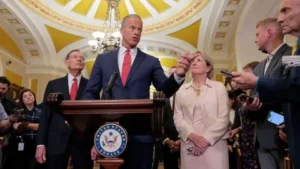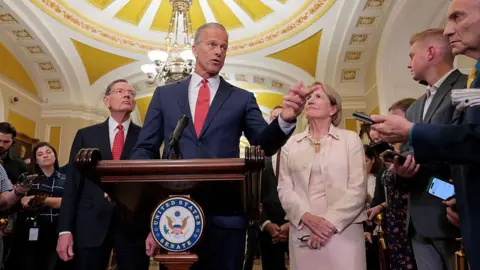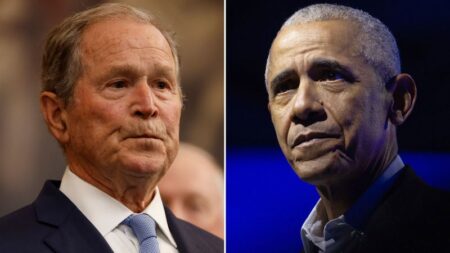The U.S. Senate has embarked on a critical voting session regarding a sweeping budget proposal termed by President Donald Trump as the “big beautiful bill.” This extensive budget plan is crucial to Trump’s political agenda and has been the subject of intense discussions and debates over the past few weeks. However, the plan faces significant hurdles as bipartisan negotiations have resulted in divisions within Republican ranks, primarily concerning the extent to which welfare programs should be curtailed to fund tax breaks within the proposed legislation, officially known as the One Big Beautiful Bill Act.
With the Fourth of July holiday approaching, Republicans, who hold a majority in both chambers of Congress, are racing to enact the bill. The Senate’s approval is just the first step; the legislation will also need to return to the House of Representatives, which narrowly passed its version earlier, underscoring the contentious nature of the proposals.
On a frantic Monday, senators traversed the Capitol, rushing to participate in amendment votes while simultaneously engaging in discussions away from media scrutiny. This voting experience, often referred to as “vote-a-rama,” allows for numerous amendments to be debated and voted upon – a process that could stretch for an extensive duration. Senate Majority Leader John Thune noted the ongoing efforts to refine the bill, indicating that the finalization of the proposal remains a work in progress.
A significant focal point of contention within the discussions has been an amendment concerning cuts to Medicaid proposed by Florida Senator Rick Scott. Estimates suggest that such cuts could potentially force approximately 20 million Americans to lose their health insurance. Responding to concerns regarding the ramifications of these measures, Thune remarked on the multitude of analyses available, suggesting a debate over the interpretations of potential impacts.
As the senators argue the merits of the amendments, Democrats continue their vocal opposition to the bill, pointing to detrimental effects on health care access for lower-income Americans. Senator Adam Schiff, a prominent Democrat from California, termed the bill “terrible,” casting doubt on whether GOP senators could meet Trump’s self-imposed deadline for passing the measure by Independence Day. Meanwhile, White House Press Secretary Karoline Leavitt expressed confidence that Trump would receive the legislation, reaffirming the administration’s stance.
Frustration was palpable among senators, most notably expressed by Pennsylvania Senator John Fetterman, who lamented the extended hours leading to missed personal plans. Democrats employed a strategic maneuver over the weekend to delay the bill’s advancement, obliging Senate clerks to read all 940 pages of the proposed legislation aloud—a move that consumed over 16 hours and underscored the contentious atmosphere surrounding the bill.
Despite being the majority party, the Republicans’ path is not without obstacles; two GOP senators, including Thom Tillis from North Carolina, opposed previous votes that aimed to initiate debate, citing necessary revisions to the legislation. Following this, Tillis announced his retirement, criticizing the bill for deserting commitments made to voters. This sentiment has echoed within conservative circles, with concerns rising from the House Freedom Caucus over the proposed budget’s alignment with fiscal responsibility. They highlighted the legislation’s potential to increase the national deficit by substantial amounts, igniting debates among Republicans.
As the Senate heads towards a full vote on the bill, which is slated to either occur late Monday or early Tuesday morning, party leaders grapple with the likelihood of defections that could prevent its passage. If three Republicans vote against the bill, Vice President JD Vance would be required to cast a tie-breaking vote. The consequences of this legislation loom large; proposals included within it seek to implement significant tax deductions, while also allowing for new borrowings that could deepen the national debt—a contentious point that has incited backlash from influential figures like Elon Musk.
In conclusion, the fate of Trump’s “big beautiful bill” remains uncertain as the Senate navigates this complex legislative labyrinth. With various factions within both parties expressing dissent and concerns over fiscal ramifications and social safety nets, the coming hours and days could determine not just the future of this budget proposal, but the broader political landscape as the nation approaches a pivotal holiday.











